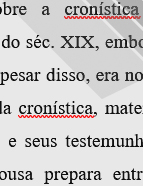

................................
This edition was later recovered in 1977, as shall be addressed later. The fact was that all of them were published under the seal of the Academia das Ciências, at times evidencing a nationalistic and conservative historicism. Also, in José Joaquim Nunes' s editions of the Crónica da Ordem dos Frades Menores [Chronicle of the Order of Friars Minor] (1918) and of the Vida e milagres de Dona Isabel [Life and miracles of Dona Isabel] (1921), also published by the Academia, his preliminary studies denoted the influence of a historiography and followed more archaic models, despite the methodological rigour of his lexical analysis.
The evolution of chronicle production studies in Portugal from the 1920s and 1930s onwards differed considerably from what had been seen up to then. In the 1920s there was a resurgence of a nationalist sentiment marked by a degree of republican anticlericalism that rapidly faded to give way to patriotism allied with the Estado Novo [New State] in the 1930s. Perhaps this was the reason why part of the historiography on chronicles pursued a cultural and historicist nationalism that spread to other domains, seeking a Portuguese essentialism that was thought to be particularly present in the origins of nationality and, by extension, in the texts on the first dynasty. At the same time, a progressive and mutual distancing was noted between historical and philological studies, possibly due to the increasing professionalisation of these areas. Influenced by the philological approach of brothers Juan and Ramón Menéndez Pidal, José Leite de Vaconcelos worked on the Crónica do Mouro Rasis [Chronicle of the Moor Rasis] (1922), a path followed by Lindley Cintra as early as the 1950s and later by Diego Catalán, both of whom, as shall be addressed, were influenced both by those researchers and each other.
Until then, studies had abounded, frequently repeating conflicting paths allied with the regime. Duarte Leite, António Dias Dinis, Henrique da Gama Barros and Álvaro Costa Pimpão explored details, which were often fruitless, surrounding the date of the writing of the Crónica da Guiné and the origin of its contents; some of these researchers, including Joaquim de Carvalho, a professor of Philosophy at the Universidade de Coimbra [University of Coimbra], raised the possibility of plagiarism on the part of the chronicler.
